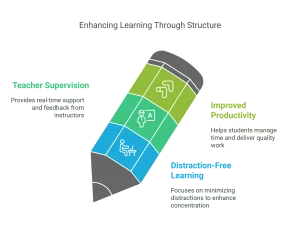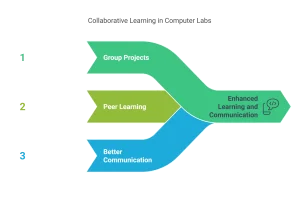Even though the use of personal devices like laptops, tablets, and smartphones increases, school computer labs continue to be a significant component of the education system. Although personal devices bring convenience and accessibility, computer labs continue to have learning advantages that cannot be replaced by personal devices. The following represents why computer labs remain critical to students today.
1. Unbiased Access To Technology And Tools
Not every school provides students with the same amount of technology access at home. School computer labs equalize the playing field so students all have access to top-end technology and specialized software.
Key Points:
- Access to technology equitably: Not all students have a home computer or a stable internet connection. This creates a digital divide for students in lower-income families. A school computer lab provides all students with the ability to use current technology while at school.
- Access to specialized software: School computer labs usually have costly but specialized software, including design packages, coding environments, and data analysis software. Such applications may be too expensive for families and are usually available only in schools.
- Accessibility of learning: Computer labs grant every student the same set of technology resources, and that’s the key to academic success. Students, whether they come from poor or rich families, can enjoy the same technologically-enabled learning processes.
By accessing technology in the school computer labs, all students have the chance to acquire essential digital skills that will benefit them throughout their education and into the future.

2. Structured Learning Environment For Targeted Education
Even though devices in the home are useful, they also have numerous distractions. Whether gaming, social media, or entertainment, students will get easily sidetracked. Computer labs offer a distraction-free, organized platform that encourages productive learning.
Key Points:
- Distraction-free learning:Going against the idea of using personal devices that usually come with entertainment and social media, computer labs exist solely for learning. This reduces distractions and allows students to concentrate only on the task at hand.
- Teacher supervision: Teachers in the computer lab have the ability to supervise students tightly and offer real-time support whenever there is a need. This enables instant feedback, error correction, and concept clarification, collectively vital to efficient learning.
- Improved productivity: With less distraction and the instructor’s supervision, students will also be more likely to stay on task. Computer labs assist students in better time management, getting the work done on time, and delivering better-quality work.
Why It Matters:
A regular learning routine provides students with the self-discipline and productivity they need to excel at school. It enables the teacher to observe students’ improvement and give them guidance when they need it.
3. Digital Literacy And Safe Internet Usage
Digital competency has emerged as the most significant skill for today’s students. School computer labs help students acquire the technology skills they need to thrive in the digital age.
Key Points:
- Acquiring vital tech skills: Acquiring software skills, problem-solving skills, and proficiency in digital tools is the key to success in the modern world. The school computer laboratory offers students the chance to acquire technical skills, from the ability to use word processing packages to sophisticated programming and data analysis.
- Secure use of the internet: Computer labs also create a controlled space wherein students learn to use the internet in a safe manner, maintain their privacy, stay safe from cyberbullying, and evaluate internet information for validity. Such education is critical in a time when students are constantly exposed to digital information.
- Critical thinking and problem-solving: Computing forces students to tackle challenges systematically. Whether they’re debugging code, evaluating data, or planning a multimedia presentation, students learn problem-solving skills that they’ll apply throughout their careers.
Why It Matters:
Because in today’s digital world, computer literacy has become a basic skill. School computer labs assist students in attaining the knowledge and proficiency they require to compete successfully in a digital world and remain secure on the internet.

4. Encouragement To Collaborations And Peer To Peer Learning
In school computer labs, students usually work in collaboration on group projects, exchange ideas, and work on activities that call for different points of view. This encourages collaboration and enables students to learn from one another.
Key Points:
- Group projects: Computer labs support collaborative learning by enabling students to work on tasks, presentations, or research projects in teams. Students can exchange files, provide feedback, and merge ideas in real time.
- Peer learning: Students regularly instruct one another in new tools or techniques while working in teams. This peer-to-peer education promotes better understanding and problem-solving, as students explain hard concepts to each other in a manner accessible to them.
- Better communication: Participation in the computer lab also enhances the communication skills of students. Whether discussing project concepts, sharing research results, or providing feedback, students learn to communicate more clearly and function as a team.
Why It Matters:
Teamwork and collaboration are critical skills in the classroom and in the working world. Students experience computer lab environments that will translate into the real world, where they will need to coordinate and work with others to achieve the solution to a problem and common objectives.
5. Exposure To Specialized Software And Career Exploration
School computer labs usually consist of software and resources that expose students to various areas of work and career choices. This enables them to research and explore areas of interest and likely career choices.
Key Points:
- Industry-level software access: Computer labs offer access to software packages like Adobe Photoshop, AutoCAD, and others used in graphic design, architecture, video editing, and others fields. Students get hands-on exposure to the software, and in case they choose to pursue these career paths, it could be helpful.
- Career discovery: Exposure to applications and specialized software will create curiosity in areas like coding, editing video and audio, animation, and engineering. The school computer labs become a starting point for students to get interested in and acquire the necessary skills related to these careers.
- Developing technical skills for career prospects: Working in a computer lab not only familiarizes students with software but also provides them with practical knowledge about problem-solving and technical debugging. Such skills are very marketable in the current times and place students in a better position when they go to work.
Why It Matters:
School computer labs equip students with the resources to discover possible career choices, acquire technical skills, and practice working with professional-level software. This exposure will enable them to make better career choices in the future.
Conclusion
Even though personal devices are everywhere today, school computer labs still offer some of the biggest benefits. They make sure every student gets equal access to technology, provide a space where students can focus without distractions, and help build important skills like using computers confidently and working together as a team. Computer labs still play a very important role in shaping a student’s education.
Recap of Key Reasons:
- Equal access: Provides all students with access to the latest technologies and specialized software.
- Tidy and organized working space: Encourages concentration and productivity by reducing distractions.
- Digital literacy: Provides the necessary technology skills and cyber security awareness.
- Collaboration: Promotes peer learning and teamwork.
- Career exploration: Introduces students to specialized software and possible career opportunities.
Having and upgrading computer labs helps every student have the chance to flourish in a high-technology world. Computer labs not only get students ready in the classroom but also prepare them for the skills they will need in the career world of the future.

